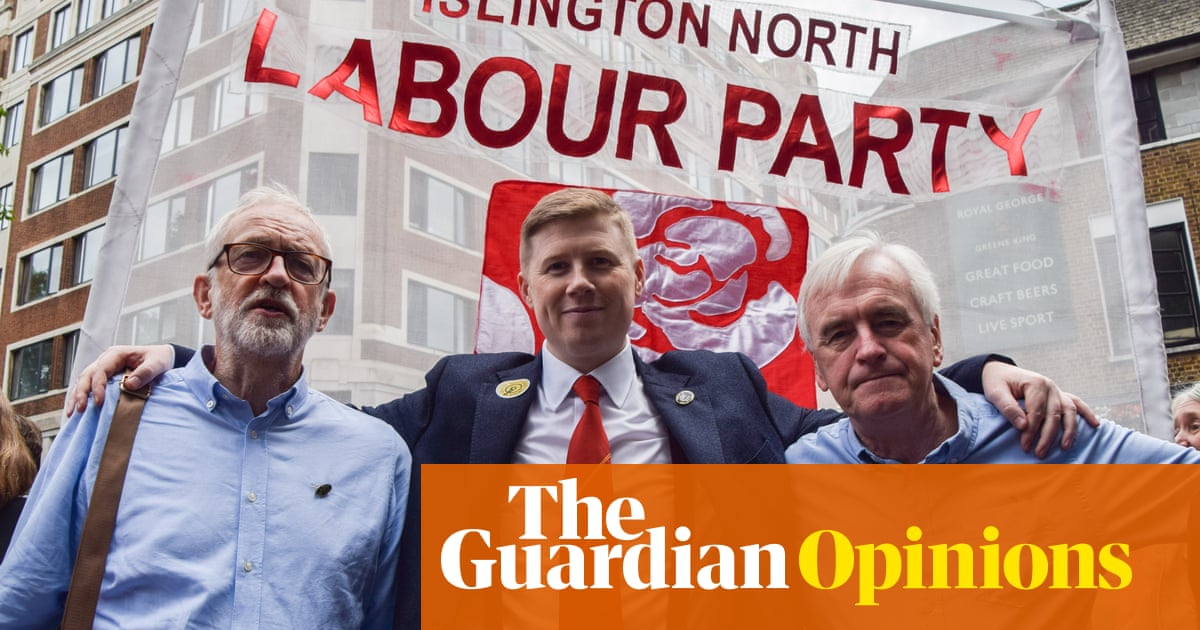
n classic Labour fashion, the party has taken the worst-of-all-worlds route over Jeremy Corbyn’s suspension. Though Corbyn has been readmitted to the party, less than three weeks after he was suspended over his response to the Equality and Human Rights Commission report on antisemitism, Keir Starmer has refused to restore the whip – meaning Corbyn will still not officially be a Labour MP.
Members on the left now see the party leadership as unjustly anti-Corbyn, while those who had taken courage from Starmer’s initial actions view this decision as disappointingly weak. The proceedings have done nothing to restore trust in the party’s disciplinary system, nor do they seem to have complied with the recommendations of the report that set off this chain of events in the first place.
Last month, shortly after the release of the EHRC report that found the party responsible for “unlawful acts” of discrimination against Jewish members, Corbyn issued a statement on Facebook. He described those denying that antisemitism exists in the party as “wrong”, but added that “the scale of the problem was also dramatically overstated for political reasons by our opponents inside and outside the party, as well as by much of the media”. While the former leader claimed it was this combination of factors that “hurt Jewish people”, Labour decided Corbyn’s response to the devastating report was unacceptable. The party responded by suspending him.
The Jewish Labour Movement congratulated Starmer on this swift action. But the suspension and the way it was handled caused an internal row to erupt. Ordinary party members and members of Labour’s ruling national executive committee (NEC) were left in the dark about what exact rule Corbyn had breached: antisemitism, or bringing the party into disrepute? The party wouldn’t say. Though Starmer insisted that Labour’s general secretary David Evans had moved to suspend Corbyn, Starmer also said “we made a very difficult decision” and repeatedly declared his support for the move.
These things may be explained by the existence of confidentiality issues over the whip decision and the suspension itself, or by Starmer needing to take a clear position on an important matter. But these apparent contradictions did nothing to reassure frustrated Labour members.
Many Labour MPs on the party’s left were privately exasperated with Corbyn’s unnecessary intervention on the day of the EHRC report, if not strictly opposed to his remarks. Others worried about being suspended themselves if they spoke out. While parliamentary Corbynites stayed relatively quiet, the Corbyn-supporting grassroots of the party believed they had been rendered powerless. Some members, irritated by Starmer publicly sharing his opinion on the suspension, started putting forward motions expressing their views on the matter, despite Evans having warned local officers against this. A number of Labour members have been suspended from the party as a result.
All the while, Unite leader Len McCluskey and former shadow cabinet member Jon Trickett MP were working behind the scenes to create a route back in for Corbyn. The ex-leader was not particularly engaged with these negotiations, according to well-placed sources. But it soon became obvious to anyone with knowledge of the talks that there was a willingness on all sides to de-escalate the situation, and that this would lead to Corbyn’s suspension being lifted. Yet Jewish Labour stakeholders were not prepared for an NEC panel to readmit Corbyn within weeks. “There was fuck-all pitch-rolling with us,” one told me.
Amid this lack of party management, it’s no surprise that the Jewish Labour Movement, Jewish Leadership Council, Board of Deputies, Labour Friends of Israel and chief executive of the Holocaust Educational Trust have all condemned the NEC’s decision to drop the case. After all, it came quickly after Corbyn issued a statement on Tuesday rowing back on some of his earlier comments but not directly apologising for them. This will make it more difficult for Labour to engage with the Jewish community, one of the recommendations of the EHRC’s report.
The EHRC found that one of the key ways in which Labour acted unlawfully was by politically interfering in the handling of complaints. Half the party now believes that the original decision to suspend Corbyn amounted to political interference; the other half thinks lifting the suspension was the result of political interference (specifically a “factionally aligned political committee”, according to the Jewish Labour Movement).
Either side can marshall convincing arguments, but this overlooks what is driving Labour’s internal crisis over antisemitism: the absence of trust. Instead of addressing this deeper issue, the charge of political interference has become a stick for members to beat each other with. The party is now more divided than ever, with Corbyn’s ordinary membership being treated as a separate issue to the question of whether the whip should be restored. Rather than moving on, Labour is stuck in a mess of its own making.
• Sienna Rodgers is editor of LabourList












